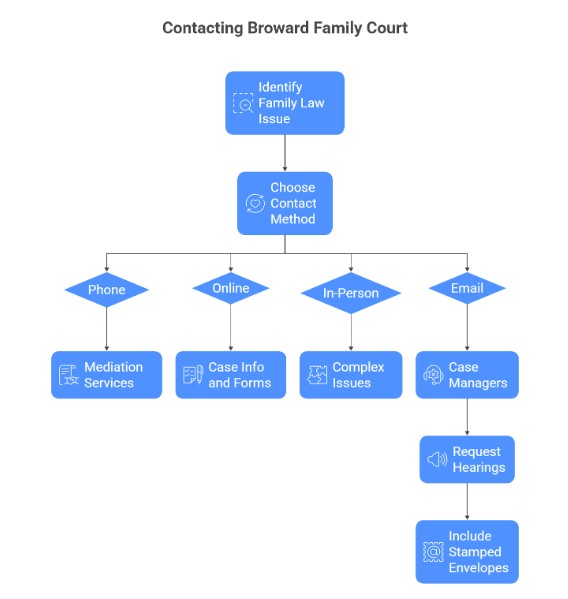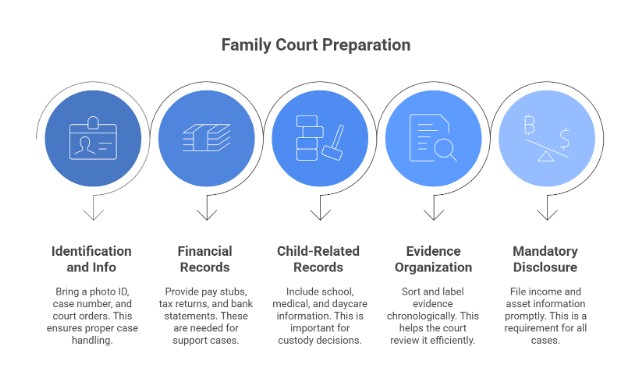
- Call for a
Confidential Consultation - 954-587-2244
- Email Us
-

Originally published: September 2025 | Reviewed by Scott A. Levine

The Broward Family Court handles child custody, child support, divorce, and mediation cases in Fort Lauderdale and surrounding areas.
Broward County families have access to a range of court services, mediation programs, and support resources to help resolve these challenging situations.
The Broward County family court system uses unified family courts, so one judge sticks with your family’s case from start to finish. That consistency can really matter when you’re dealing with complicated legal stuff.
Parents and guardians need reliable contact info and clear guidance to access these essential services.
The court handles a wide range of family law matters—divorce, paternity, child custody, and domestic violence, among others.
Broward Legal Aid provides free representation for families who qualify. That’s a lifeline if you’re dealing with complicated legal situations and can’t afford a lawyer.
Knowing how to contact the court, preparing your paperwork, and utilizing available resources can significantly impact your case.
The family mediation program provides low-cost alternatives to going to court, enabling families to resolve issues before they escalate.
This guide compiles the essential contact information and practical steps families need to navigate Broward’s family court system.

Broward Family Court serves as the primary legal hub for divorce, child custody, and support issues when families undergo significant changes.
The court offers mediation and centralized resources to help parents and spouses work through complex family law matters.
Broward County family courts handle domestic matters like divorce, custody, child support, and paternity cases. The Unified Family Courts system puts one judge in charge of everything for your family.
This approach keeps decisions consistent. Families don’t have to repeat their stories again and again. The same judge gets to know your situation and history.
Key Family Law Services:
Family court mediation helps resolve disputes in tough divorce or property division cases. Mediation is typically less adversarial than litigation in court.
During mediation, a neutral third party assists families in reaching agreements. This process can save time and spare everyone, especially children, a lot of stress.
Broward County’s 17th Judicial Circuit handles all family matters in one place. This centralized approach makes it simpler to file paperwork and get services.
Parents and spouses can handle multiple legal tasks without having to run all over town. The Clerk’s Office processes adoption, divorce, name changes, and paternity cases under one roof.
Available Resources Include:
Low-cost mediation services are available if your combined income is under $100,000 a year. That opens the door for many more families to access legal help when finances are tight.
The court system understands that divorce or separation affects everyone involved. Centralized services can reduce confusion and provide clearer guidance when things become stressful.

The Broward County Family Court operates through the 17th Judicial Circuit. You can reach them by phone, online, or in person for matters related to custody, support, and other family issues.
The Broward County Clerk of Courts handles all family law cases in Fort Lauderdale. The main courthouse sits in the Broward County Judicial Complex.
Contact Information:
The 17th Judicial Circuit oversees all family court matters—divorce, custody, and child support included.
For even more specifics, you can check the complete telephone directory for each court division. It lists numbers for family law, domestic violence, and probate.
If you’re ready to get started, call us now!
The Clerk of Courts keeps court records and handles intake for family cases. They also collect fines and run jury services.
Clerk Services Include:
Self-help centers offer free support to parents handling their own cases. They provide forms, instructions, and basic legal guidance.
You can prep a lot of your documents online before heading to the courthouse. The website has downloadable forms for common family law issues.
Call the specific division that handles your type of case. Family law cases cover adoption, divorce, name changes, and paternity.
Contact Methods:
If you’re representing yourself, you’ll need to email case managers to request hearings. Don’t forget to include self-addressed stamped envelopes for all parties.
The Unified Family Court system assigns one judge to each family’s matters—custody, support, and visitation included.
Broward County Family Court handles all custody issues through specific parenting plan rules and procedures.
Parents need to know Florida’s standards for time-sharing and how courts decide what’s best for minor children.
Florida law says parents must create a detailed parenting plan if they have minor children. The Florida Supreme Court-approved family law forms provide templates you’ll need to use.
Required Elements in Every Parenting Plan:
The plan must explain how parents share parental responsibility. This means who decides about education, healthcare, and religion.
Broward County utilizes approved parenting plans that outline everyone’s rights and responsibilities. Judges use these plans to make final time-sharing orders.
Parents in paternity actions must also complete parenting plans. The court won’t finalize custody without one.
Parents can request custody hearings by filing petitions with the Clerk of the Circuit Court in Broward County. The family law division handles these, along with divorce and paternity cases.
Steps to Request a Hearing:
Broward’s Unified Family Courts assign a single judge to handle all matters for each family. That helps keep things consistent across different cases.
If you want to change an existing time-sharing arrangement, you must show there’s been a significant change in circumstances. Courts look for proof that any changes are in the child’s best interests.
Visitation modifications often mean tweaking weekend, holiday, or summer schedules. It’s not always easy, but sometimes it’s necessary.
Florida family courts decide custody based on the best interests of the child. Judges consider several factors when determining time-sharing arrangements.
Key Factors Courts Consider:
The child’s age and developmental needs are crucial factors in custody decisions. Younger kids may need different setups than teenagers.
Judges also consider whether a parent supports the child’s relationship with the other parent. If a parent attempts to block visitation or time-sharing, the court may not look favorably on that.
Parental responsibility ultimately boils down to who can make significant life decisions for the child. Sometimes, courts order shared responsibility, but in certain areas, one parent may have the final say.
If you’re facing disputes over support or custody, Levine Family Law can represent you in Broward Family Court mediation. Secure fair solutions for your family—schedule your consultation now.
If you’re ready to get started, call us now!
Broward County offers parents several options for establishing and enforcing child support. You can go through the Florida Department of Revenue or the Broward County Clerk of Courts.
Parents can file cases directly with the family court or use state enforcement services. Both options work, but which one you pick depends on your situation.
In Broward County, you basically have two main filing options for child support. You can file through the Broward County Clerk of Courts family division or apply via the Florida Department of Revenue’s child support program.
The Unified Family Courts in Broward County assign one judge to each family, covering cases involving child custody, visitation, support, divorce, paternity, and alimony.
Filing Options:
Parents handling divorce or paternity usually deal with child support in family court. If you need help enforcing an order, the state program steps in.
The child support process shifts a bit depending on whether you use the court or the state enforcement program. Florida’s child support guidelines set payment amounts based on a list of factors.
Required Information for Filing:
Courts use these guidelines to figure out support. Children of unmarried parents have the same support rights as those of married parents.
Enforcement Services Include:
If you want to modify an order, you must demonstrate a significant change in circumstances. File your modification request through the same system that gave you the original order.
The Florida Department of Revenue’s child support program enforces support orders for over a million kids across the state. Between 2006 and 2007, they collected $1.26 billion in payments. That’s a staggering number.
Florida Department of Revenue Services:
The department runs a State Disbursement Unit. Customer service hours will change to 7:30 a.m. – 5:00 p.m. starting September 2, 2025.
Broward Family Court Services:
The family court handles the full range of family law issues. The state program mainly handles support enforcement and collections.
Broward County offers court mediation services for families seeking to resolve disputes outside of trial. Mediators help with custody, child support, and property division.
The Family Mediation Program steps in for all sorts of family law disputes if you’ve got an open court case. Most cases arise before or after divorce, but they are not limited to that.
Common mediation topics include:
Mediation provides families with a means to discuss their issues with a neutral third party. The mediator helps everyone communicate and, ideally, find common ground.
The process applies to both pre-divorce and post-divorce disputes. Parents can sort out custody without dragging things through a long court fight.
Mediation services enable families to resolve disputes without the need for a trial. It usually saves time and cuts down on stress for everyone.
Key advantages include:
The informal setting can make it easier to talk things through. Parents get to focus on what works for their kids, not just on “winning” in court.
Mediation sessions stay confidential. That privacy lets everyone speak more openly, without worrying about public records or gossip.
To utilize court mediation services, families must follow specific steps. If you don’t qualify for court mediation and you agree on a mediator, upload an Order for Mediation through the court system.
If you can’t agree on a mediator, you’ll need to ask for a hearing. The court will pick a mediator during the Motion Calendar hearing.
For county court cases, parties must:
The courthouse sits at 201 S.E. Sixth Street. It’s advisable to contact the mediation program office to confirm scheduling and ensure your paperwork is in order before the session.

Good preparation helps court proceedings run smoothly and prevents delays or rescheduling. Bring identification, case paperwork, and any evidence you might need—have it all ready and organized.
Required Identification and Case Information:
Essential Documentation: Parents should bring all relevant financial records for custody and support cases. That means recent pay stubs, tax returns, and bank statements.
Don’t forget child-related records—school, medical, and daycare info all matter.
Evidence Organization: Sort evidence chronologically and label everything clearly. Print photos with dates and short descriptions.
Print or save text messages and emails with visible timestamps. Courts may not accept evidence shown only on your phone, so ensure everything is properly formatted.
Mandatory Disclosure Requirements: Family court cases have financial compulsory disclosures. You’ll need to file income and asset information within 45 days of starting your case.
Document Preparation: Self-represented litigants should fill out all forms accurately before arriving. Bring several copies—one for the court, one for the other side, and one for yourself.
Research and Forms: Use Florida Supreme Court-approved family law forms. These come with instructions and examples, so take advantage of those.
Courtroom Etiquette Items: Bring a notebook and pen for jotting down notes. Dress in business attire—better to be a little overdressed than under.
Emergency Contacts: Keep emergency contact info handy. That includes childcare providers and your work supervisor, just in case your schedule changes unexpectedly.
Payment Methods: Carry exact cash or a money order for court fees. Some places accept cards, but cash or money orders are usually safer in case of any unexpected costs.
Security Requirements: Everyone walks through metal detectors at courthouse entrances. You might have to send your electronic devices through a separate screening line.
Leave weapons, large bags, and certain electronic devices at home. It’s a good idea to review the Broward County Clerk’s policies before you arrive, just in case there have been any changes.
Timing and Scheduling: Get there about 30 minutes early to handle security and parking without stress. Court calendars can easily run late, especially when things get busy.
Pack a snack and a water bottle—you could be waiting for a while. Some courthouses have cafeterias, but honestly, outside food is usually cheaper and sometimes just easier.
Children in Court: Only bring your children if the court specifically requests them, or if they need to testify. Broward County offers limited childcare during court, but it’s not always available.
Comfort Items: Those courthouse benches get uncomfortable fast, so a seat cushion can really help. Don’t forget your phone charger; you’ll want to stay connected during long waits.
Parking Preparation: Research parking options and fees before you arrive. Parking lots fill up quickly during peak times, so it’s a good idea to have a backup plan or arrive earlier than you think necessary.
When custody or support issues require court involvement, Levine Family Law is here for Broward County families. Get clear direction for your case and your peace of mind—contact us today.
How do I contact Broward Family Court?
You can reach Broward Family Court at the Broward County Courthouse in Fort Lauderdale, call the clerk’s office, or use the Florida Courts online portal for case details and scheduling.
What cases does Broward Family Court handle?
Broward Family Court oversees divorce, child custody, child support, paternity, domestic violence injunctions, and mediation. It provides a single venue for resolving family law disputes under Florida law.
Where do I file for child support in Broward County?
Parents can file for child support through the Broward Family Court or the Florida Department of Revenue. The court system handles enforcement, modifications, and payment monitoring.
Does Broward Family Court offer mediation services?
Yes. Mediation is required in many custody, visitation, and support cases before trial. Broward Family Court offers mediation sessions to assist parents in resolving disputes without the need for lengthy litigation.
What documents should I bring to Broward Family Court?
Bring your photo ID, case number, copies of prior court orders, financial records, and any evidence relevant to your case. Self-represented litigants should prepare organized documentation.
Can I modify a custody order in Broward County?
Yes. Custody orders may be modified if a “substantial and material change in circumstances” occurs and the change is in the child’s best interests. Parents must petition the court for modification.
Do I need a lawyer for Broward Family Court?
While you can represent yourself, Broward Family Court procedures can be complex. A family law attorney helps protect your rights, ensures filings are correct, and increases the chance of favorable outcomes.
Proudly Serving All Areas Of: